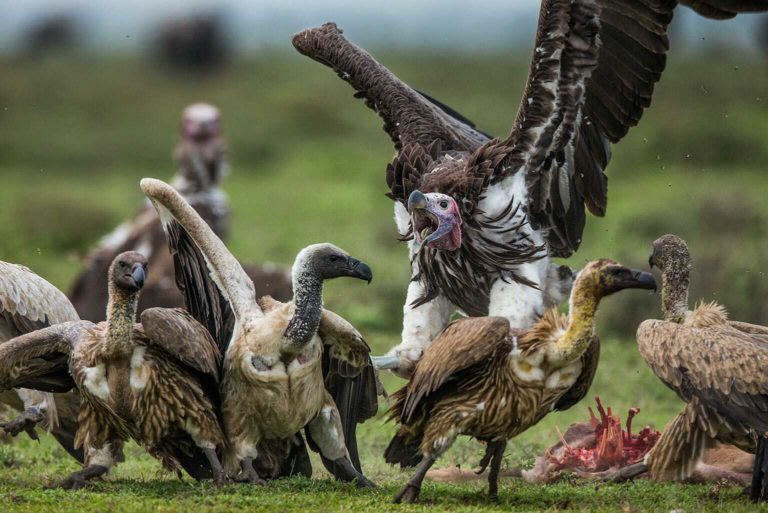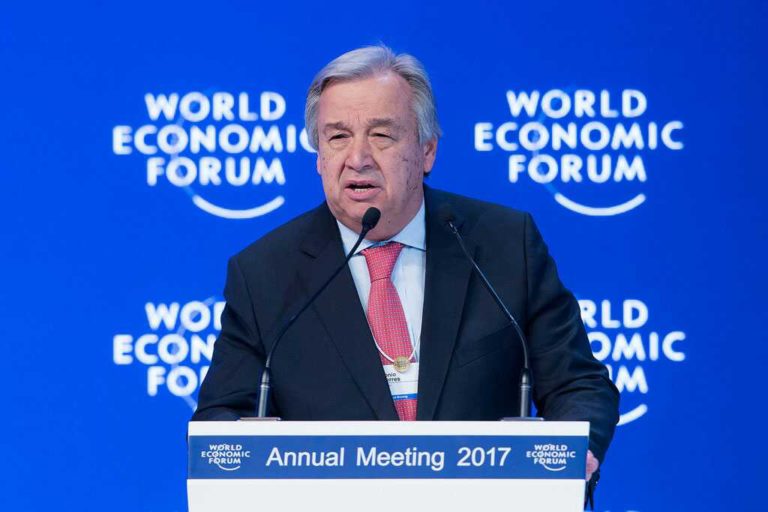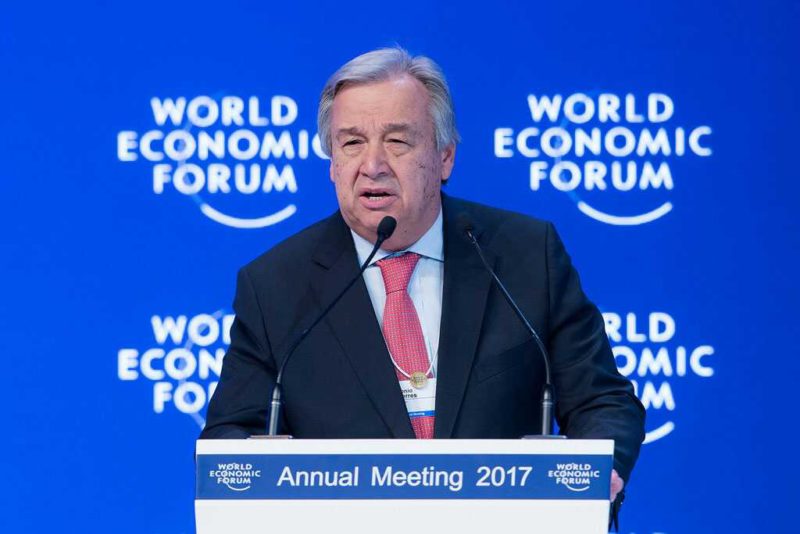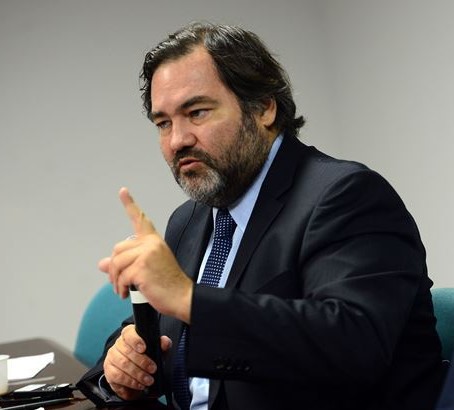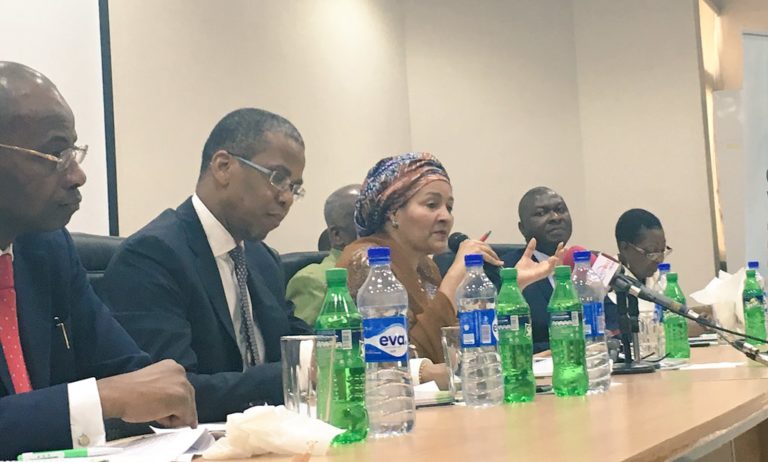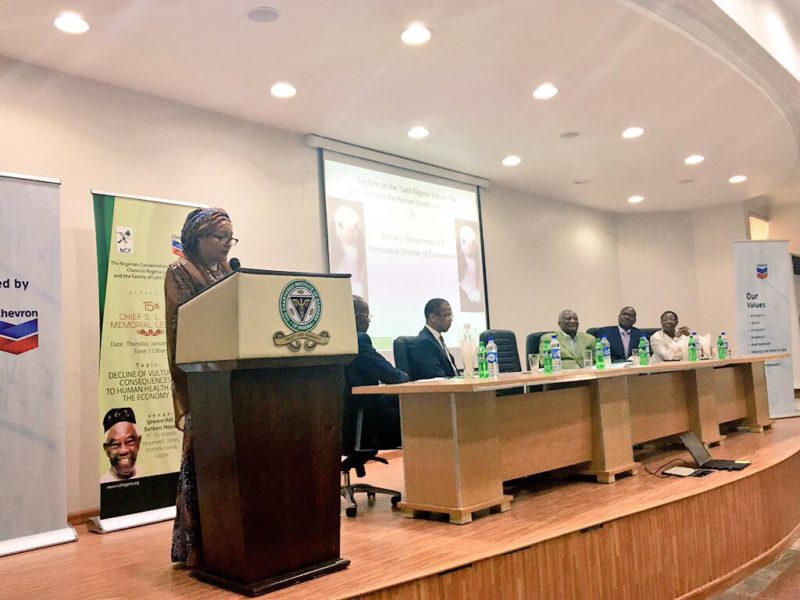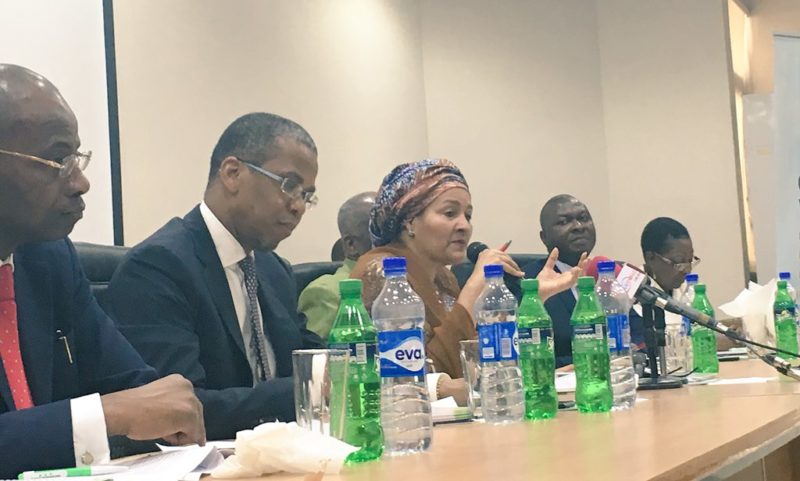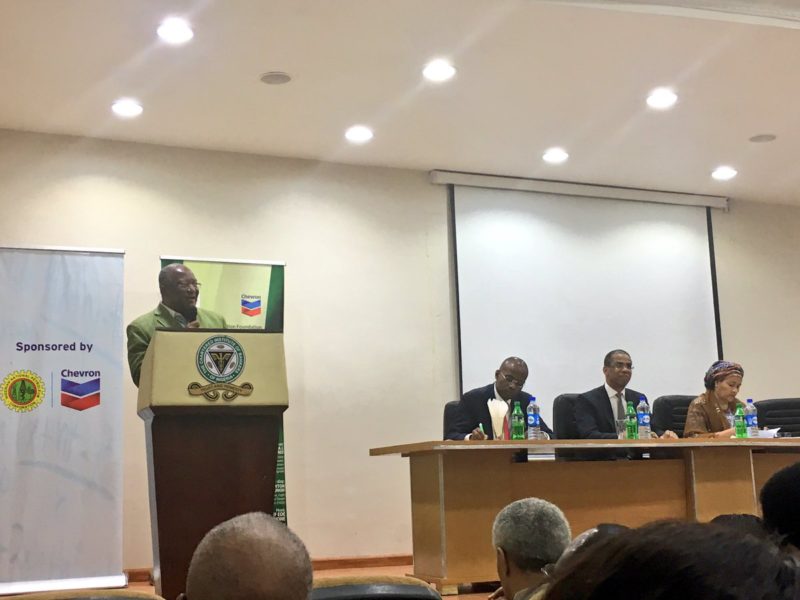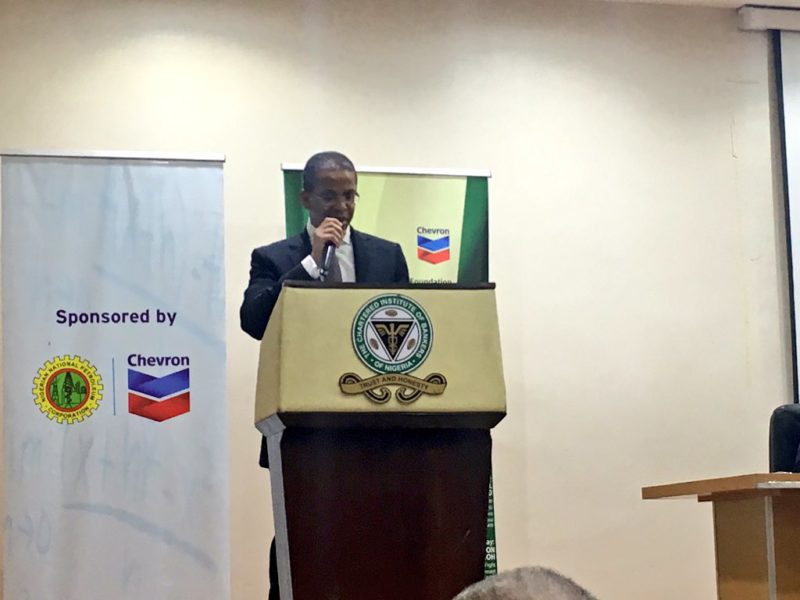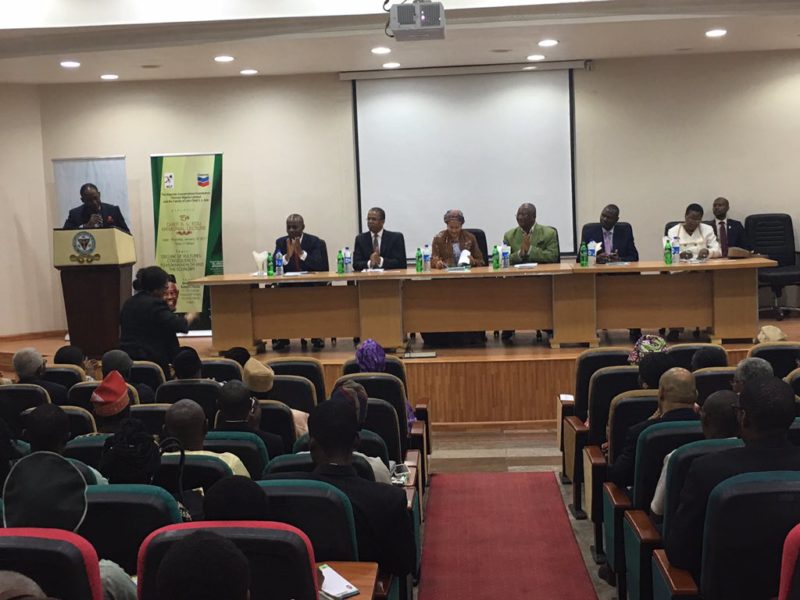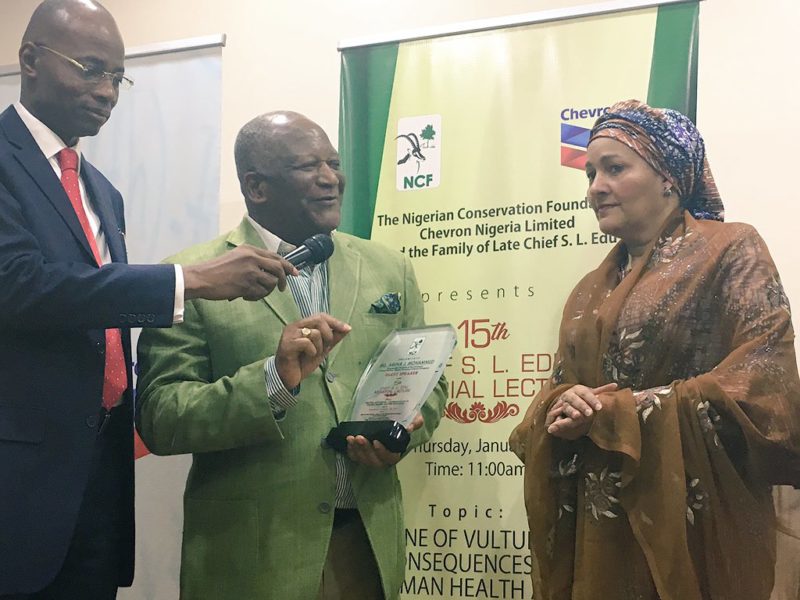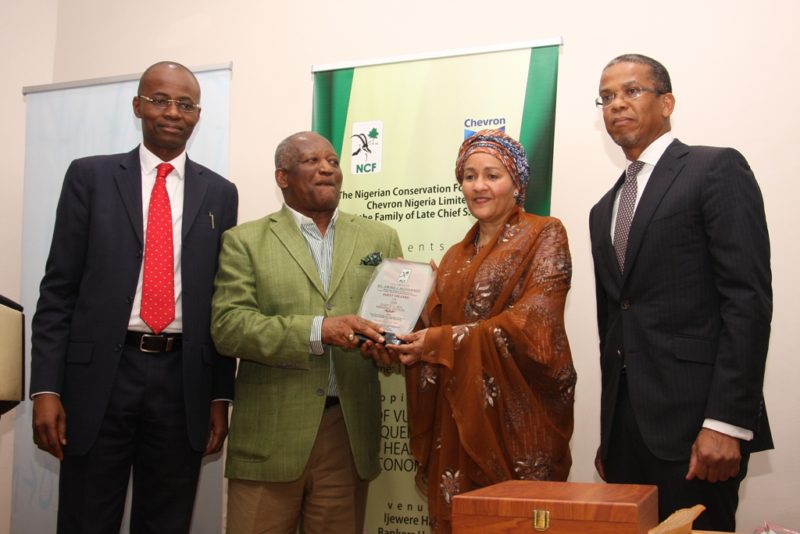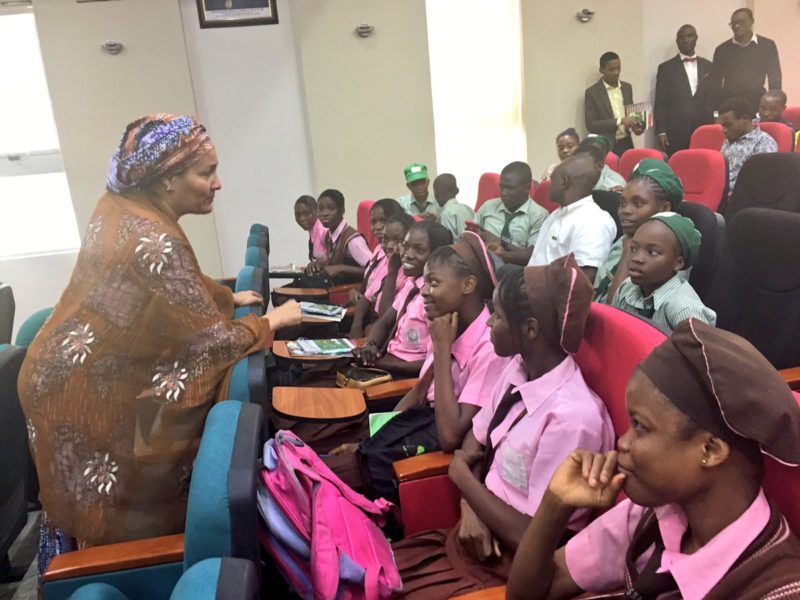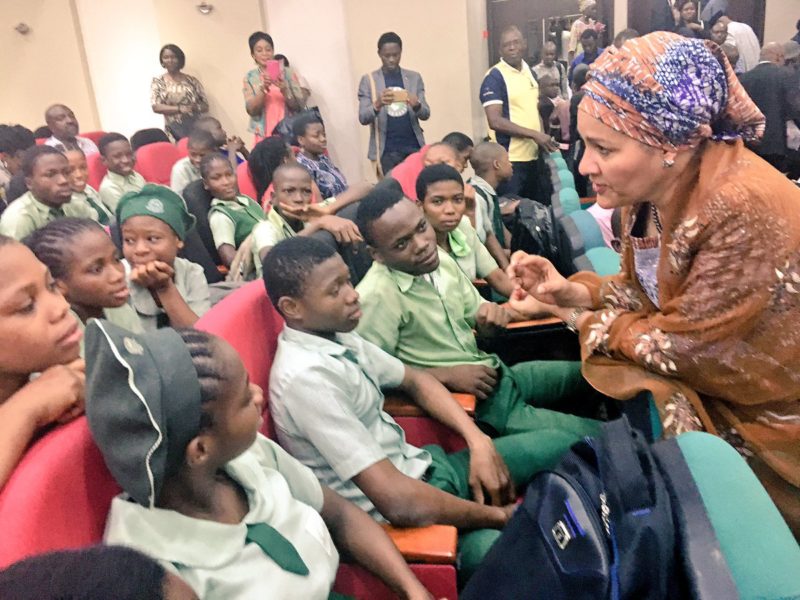The vulture, a large, carnivorous bird that is most well known for its scavenging nature, caught the attention of the Nigerian nature conservation community last week in Lagos, where stakeholders reiterated their commitment to the upkeep of the endangered bird of prey.
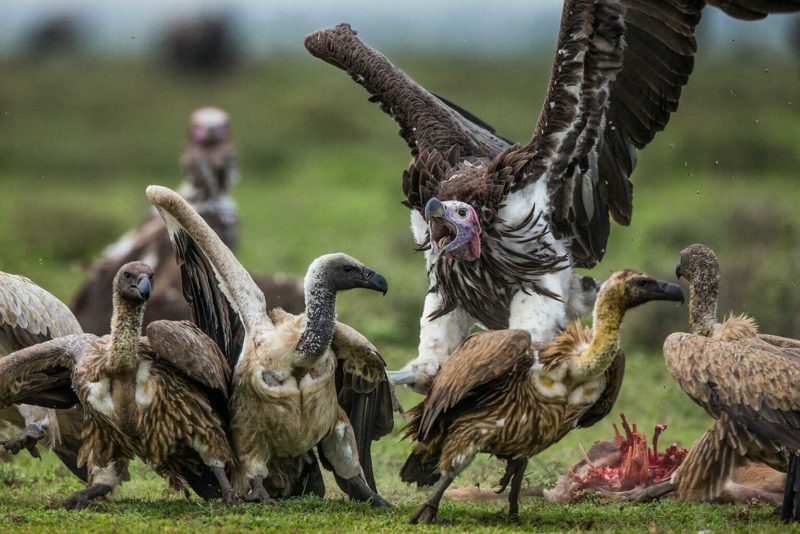
At the 15th Chief S. L. Edu Memorial Lecture held on Thursday, 19 January 2017 at the instance of the Nigerian Conservation Foundation (NCF), Minister of Environment and United Nations Deputy Secretary-General Designate, Amina Mohammed, while describing the vulture as nature’s most effective garbage disposal system, however lamented that vulture species are critically endangered.
In a presentation titled “Last Nigeria vulture: The consequences for health and the economy,” the minister, as guest speaker, estimates that a single vulture provides a scavenging benefit worth around $11,600 per year, adding Avian scavengers are capable of removing a thousand tons of carcasses per year.
Her words: “Without vultures to efficiently remove large amounts of decayed meat, both air and ground water would show increased contamination. Hence vultures are for want of a better word often referred to as our ‘sanitation officers’. The link between vultures and human health and their ecological and economic role (such as through eco-tourism), conservation of African vultures will contribute to the achievement of the Sustainable Development Goals, especially Goals 2, 12, and 15 and The Aichi Biodiversity Targets 1, 2, 3, 4, 7, 12 and 14.”
According to her, there are 11 species of vulture in Africa and seven of these are on the edge of extinction. Four, she adds, are now on the critically endangered list while another three are endangered.
In Nigeria, there were formerly six species of vultures, known as Egyptian Vulture (Neophron percnopterus), Hooded Vulture (Necrosyrtes manachus), African white-backed (Gyps africanus), White-headed (Trigonoceps occipitalis), Ruppell’s griffoo (Gyps rueppellii) and Palm-nut Vulture (Gypohierax angolensis). Out of these, five species are close to extinction in some parts of the country, she discloses, adding that the only two thriving species are Hooded and Palm-nut Vultures and they are being threatened by loss of habitat and indiscriminate hunting.
“The threat facing vultures are diverse and challenging. Africa continues to have the highest global rate of primary forest loss. Therefore, habitat loss degradation poses some levels of threat to vultures,” she says, listing challenges faced by the vulture to include:
- Vultures are being hunted and killed as a result of targeted poisoning of carnivores using baited carcasses often in response to predation of livestock.
- Elephant or Rhino poachers who deliberately poison vultures, which draw attention to poaching activities, or vultures may ingest poison used to kill the elephants.
- Vultures often suffer mortality caused by collision with or electrocution by power generation and transmission infrastructure such as power lines and wind turbines.
- Vultures are also used as traditional medicine. The feathers and head are used for ritualistic purposes and export to countries around the globe.
- Vultures are also delicacy to some communities. They often serve as alternative to chicken in some parts of Nigeria.
- Nigeria’s population has more than doubled in the last 50 years. This has caused land to become stressed with habitat under threat further exacerbating the future of birdlife.
The minister suggests that improved partnerships which cut across public and private sector will be key to putting a stop to making vultures a thing of history. She believes that collaboration with state governments and supporting the preservation and repopulation of vultures is important as well as encouraging states and local governments to own the conservation agenda by underscoring the economic and health gains is vital to achieving the desired goal.
Private sector investment in vultures, she insists, should not be overlooked. According to her, investing in the conservation of the vulture and other endangered species will support a better ecosystem and provide new economic opportunities in eco-tourism.
“The National Domesticated Reviewed Endangered Species Act, (CITES) signed on the 30th of December 2016 by the President is a clear example of government’s commitment to protecting endangered species. Hooded vulture is listed in schedule II,” she contends, adding that, in addition to strengthening regulatory frameworks, Nigeria is signatory to a few Conventions such as Convention on Biological Diversity (CBD), the Ramsar Convention of Conservation of Wetlands International, Convention on Migratory Species (CMS) and African-Eurasian Waterbird Agreement (AEWA), and has thus adopted the Africa-Eurasian Migratory Landbirds Action Plan (AEMLAP).
She ponts out that the 2016 United Nations Environment Assembly led to the implementation of a new resolution on wildlife crime and trade, implying that African governments can now act to prevent the poisoning of vultures.
Chief Ede Dafinone, Chairman, National Executive Council of the NCF, states that the has been carefully selected because of the danger posed by the declining population of vultures.
“This situation is scary since it could lead to a major human disaster if solutions are not provided on time. This issue, though universal, must have national actions to reverse the trend as some nations all over the world are already acting, and Nigeria must not be left behind. The good news is that, we are still alive, so I believe the disaster could be avoided once we promptly take the necessary actions,” he says, adding:
“As NCF, we have recognised the danger and we are willing to deploy all within our means to fight for the protection of vultures. We are open to collaboration both with the Ministry of Environment and other stakeholders to ensure the survival of vultures in our environment.
In implementing our advocacy programmes, we would deploy all available mechanism, and partner with willing organisations and individuals. Our doors are always open for collaboration, hence a clarion call to all meaningful Nigerians, both corporate and otherwise, to support this cause.”
Mr Adeniji Karunwi, Director General of the NCF, reveals that, over the years, the NCF recognised the dangerous trend of declining population of vultures, a development he discloses led NCF, the BirdLife Partner in Nigeria, into collaborating with both local and international partners, notably BirdLife International, to bring the plight of vultures into global focus. “This has resulted into more awareness about vultures and their importance in the ecosystem,” he adds.
“Locally, we have developed a ‘National Vulture Advocacy Plan’, which we are hoping the Federal Ministry of Environment will partner with us to launch and will drive all plans into action. This well-articulated advocacy plan cuts across different aspects that will help bring the plight of Nigerian vultures into the public space for discussion to further promote their conservation.”
He notes that the occasion of the lecture also serves as the platform for the presentation of awards to the two grantees of the Chief S. L. Edu Memorial Research Grant for PhD studies. The two winning proposals, Karunwi stresses, were chosen out of 37 research proposals received from all the six geo-political zones of Nigeria.
“With this year’s award, Chevron Nigeria Limited has sponsored, without break, the Research Grant for 15 years, thereby tremendously strengthening research in biodiversity conservation in Nigeria by building the capacity of young conservation professionals. I want to specially acknowledge Chevron Nigeria Limited, a company that has shown its great support for NCF’s conservation activities over the years.”
Mr. Esimaje Brikinn, General Manager Policy, Government and Public Affairs, Chevron Nigeria Limited, describes the topic of the lecture as very apt as, according to him, it captures the interdependent relationship between a scavenging species in the natural habitat and human health plus economy.
His words: “As we all know, Health and the Economy are two areas that are very essential to the survival of the human race. Without a healthy society, humanity will gradually walk into extinction; and without a good economy the survival of the human race is laden with questions. Yet these two – health and economy – are dependent on nature. Healthy businesses lead to healthy economies and healthy businesses are built on healthy people.
“Businesses are built on resources that have been provided by nature, and most of the things needed to maintain a healthy life is sourced from the same nature. It is this understanding that drives our business operations at Chevron. We seek to preserve nature in its fullest as we do business. We believe in sustainable development.
“We continuously evaluate and strive to improve our processes to ensure a healthy and sustainable environment. Our Environmental Stewardship Process aids in identifying, assessing and managing environmental concerns in a manner that ensures the protection of human health and nature. We believe in the global initiatives against climate change; in this regard, we have developed and have started implementing a strategy towards eliminating flared gas. We are firmly committed to this resolve. We also believe research is important in our quest to sustain and preserve this beautiful world we live in.”

